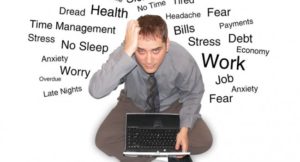 Stress is a part of life whether from jobs, family events, health issues, or balancing busy schedules. But while we all experience stress, women and men handle stress differently due to hormonal responses of the body. Both men and women release equal amounts of the hormones cortisol and epinephrine when encountering stress. These hormones cause the heart rate to rise and increases in blood pressure and blood sugar levels; however, women release higher levels of the hormone oxytocin, which produces relaxing emotions. Since men do not release as much oxytocin, they feel the physical effects stress more intensely than women.
Stress is a part of life whether from jobs, family events, health issues, or balancing busy schedules. But while we all experience stress, women and men handle stress differently due to hormonal responses of the body. Both men and women release equal amounts of the hormones cortisol and epinephrine when encountering stress. These hormones cause the heart rate to rise and increases in blood pressure and blood sugar levels; however, women release higher levels of the hormone oxytocin, which produces relaxing emotions. Since men do not release as much oxytocin, they feel the physical effects stress more intensely than women.
While these physiological responses can help men with quick decision making or coping with a high-pressure situation, over the long term, the effects of stress are dangerous on the body. Unmanaged stress leaves men vulnerable to such symptoms as back pain, anxiety, insomnia, fatigue, and depression. In addition, cortisol and epinephrine suppress the immune system, putting the body at risk for more incidences of minor illnesses like cold and flu or major health issues, such as heart disease, high blood pressure, cancer, and stroke.
While no man can avoid stress entirely, there are steps every man can take to help manage the effects of stress:
• Exercise regularly. Exercise helps you blow off steam and release tension, which reduces stress. Joining a local recreational sports team or playing a pick-up game of basketball with friends has the added benefit of providing social support, which can also reduce stress.
• Get adequate rest. Of course, sometimes stressful situations demand long days, but whenever possible, give your body ample rest so that you can feel recharged and ready to face new challenges. Avoid caffeine and alcohol as they can cause sleep disturbances.
• Eat a healthy diet. Sometimes it’s easiest to go for fast food or processed options when you are feeling stressed, but these choices have little nutrition and can leave you feeling sluggish. Eating a balanced diet with plenty of fruits and vegetables will help you feel energized and keep your body functioning properly.
• Try a massage. Human touch has long been known as a stress-reliever, and massage has been shown in studies to reduce pain and anxiety and increase sleep quality in patients with chronic low-back pain.
• Visit a doctor of chiropractic. Stress can cause muscle tension that can lead to misalignments of the spine known as subluxations. Your chiropractor will remove subluxations that interfere with your nervous system’s natural ability to function at its best. Your chiropractor will also be able to offer additional nutritional and lifestyle information to help manage your stress.
Unfortunately, only thirty percent of men say that they manage stress successfully. If you are not one of the thirty percent, try to incorporate at least one of these steps into your life to help negate the harmful effects of stress on your body and help you feel more energized and clear-headed to face whatever challenges life brings.




Leave A Comment
You must be logged in to post a comment.